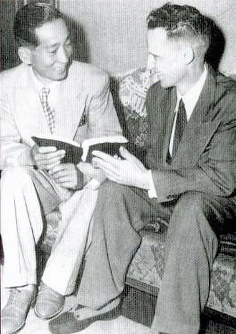• Daniel Baker
Posted in Evangelism, Sermons

Last Sunday we looked at Acts 5 and what it says about the power of God—his holy power that (rightly) inspires fear and his healing power that inspires faith. As Christians we live with the dual awareness that our God is both a "consuming fire" (Heb 12:29) and so we ought to be reverent, and he occupies a "throne of grace" (Heb 4:16) and so we ought to run to him boldly and often!
One story that demonstrates both of these is the story of Mitsuo Fuchida and Jacob DeShazer. Both were involved in the "Day of Infamy," the Japanese attack on Pearl Harbor, but in very different ways.
Fuchida was a Japanese naval captain who led their air attack on Pearl Harbor. Despite being shot 21 times he miraculously survived and returned to his carrier. DeShazer was a member of General Doolittle's Raiders who bombed Tokyo in retaliation for Pearl Harbor. DeShazer's anger against the Japanese led him to say that "if he could only get his hands on the guy who had led the raid on Pearl Harbor, he would slit his throat." God had a very different plan.
Following Pearl Harbor the two men would experience the war very differently. Fuchida would be saved from death in astonishing ways several more times. He was assigned to go to Hiroshima for a meeting but was unexpectedly called back to Tokyo and escaped the nuclear blast in that city by one day. He led a team of advisors to assess the damage in Hiroshima and the other dozen men on that team would die from radiation exposure. Fuchida would survive without harm.
In complete contrast, DeShazer's B-25 crashed after the raid on Tokyo, and he spent an agonizing 40 months in a Japanese prison being tortured and beaten repeatedly. This did nothing to ease his bitterness against the Japanese. Yet, in those months of imprisonment he was given a Bible. Reading it, he was saved and committed to a life of forgiveness and service. That story would also change Fuchida's life forever.
Fuchida's spiritual journey really began when he spoke with a fellow army engineer who had been imprisoned by the Americans. He expected his comrade to have stories of American brutalities against prisoners. He was intending to use such evidence during his war crimes tribunal, commissioned by General MacArthur. What he heard shocked him. Not only were the Americans not given to such torture, but a nurse named Peggy Covell assisted them in many ways. Peggy's story was all the more remarkable because her parents had been beheaded by the Japanese for the "crime" of being missionaries. Peggy carried on their mission of service to the Japenese. Fuchida was dumbfounded.
Later in a Japanese subway station he would hear DeShazer's story. Someone handed him a pamphlet called, "I was a Prisoner of Japan." In it he read of DeShazer's conversion and radical change of heart toward the Japanese. Fuchida gave his life to Christ and committed to serving him as long as he was able. He would tell one of his interviewers, "That’s when I met Jesus. Looking back, I can see now that the Lord had laid his hand upon me so that I might serve him."
The story became even more personal for these two men in 1950 when they met. The picture above surely is worth a thousand words in this case. They would go on to minister together and spread the gospel throughout Japan. Estimates are that perhaps 30,000 people became Christians because of DeShazer alone, even more with the two men working together.
God's power is both mysterious and wonderful. Both men would always wonder why their lives were spared and not others. Both would marvel at the circuitous journey of conversion the Lord chose for them. And yet both are testimonies of the power of God to do something even more amazing than forming the continents and constellations: Our God can even change a human heart.
As Thomas Watson reminds us,
Great power was seen in bringing us out of nothing, but greater power in helping us when we were worse than nothing.
Thomas Watson, A Body of Divinity
Amen.
Daniel
Previous Post
